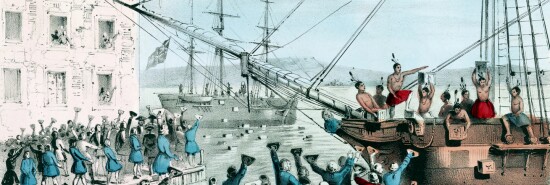
The Boston Tea Party was a rebellion against bailouts
Timothy P. Carney
Two hundred and fifty years ago tonight, the people of Boston carried out one of the greatest feats of mass civil disobedience in American history, the Boston Tea Party. Bostonians broke into cargo ships in the harbor and dumped the tea overboard.
This was, in the words of an NPR correspondent in 2015, “an anti-tax act of vandalism against the English crown in 1773.”
BIDENOMICS IS DESTROYING THE AMERICAN DREAM
But that’s wrong. The Boston Tea Party wasn’t exactly anti-tax. It was, in fact, a rebellion against a bailout and against corporate welfare.
The Tea Act of 1773 was not a tax hike. It was a sweetheart deal to try and save the failing British East India Company, which was a government-sponsored enterprise.
The East India Company had made some imprudent investments and found itself short on cash. It had to take out massive loans from the Bank of England, which it expected to pay off with the proceeds from some sales it expected.
Things went badly. American Heritage magazine told the tale 25 years ago:
“With buyers scarce, most of the sale had to be postponed, and when the loan fell due, the company’s coffers were empty. On October 29 the bank refused to renew the loan. …
“The East India Company had eighteen million pounds of tea sitting in British warehouses. Selling it in a hurry would do wonders for its finances.
“The American market beckoned, but there were two problems. First of all, the company was required by law to sell its tea to the highest bidder in England, letting merchants there and in America ship and resell it.
“Second, tea sold in America carried a tax of threepence a pound, which made it unpopular with restive colonists.
“After prolonged wrangling, in May 1773 Parliament let the company eliminate the middleman and market the tea itself through its own American agents. It also refunded duties that the company had paid upon bringing the tea to England.”
CLICK HERE TO READ MORE FROM THE WASHINGTON EXAMINER
That is, the government tried to bail out a faltering company by granting it special favors. The bailout was also intended to induce colonists to pay the royal tax on tea because the bailout allowed the East India Company to undercut smugglers.
We should all honor the Boston Tea Party as a great act of defiance against an oppressive and unjust government. And we should remember that the injustice was, in large part, the government picking winners and losers.
